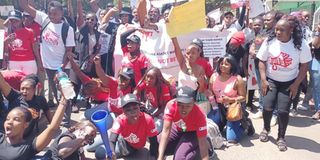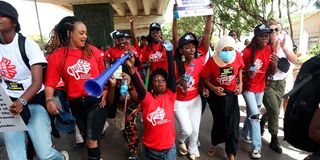We've just begun: Rallying cry for war on femicide

Women lie on the road outside KICC during anti-femicide demos in Nairobi on January 27, 2024.
What you need to know:
- Feminists, male and female, were intent to send a strong statement on the surge in the killing of women that enough is enough.
- Kenyans, most of them women, flocked to the streets across cities and major towns in the country to make their voices heard.
- They came out in their thousands, and, in their diversity, spoke in one accord.
The #TotalShutDownKE, #EndFemicideKE march was the mother of all protests by civil society and human rights organisations in Kenya.
Women came out in their thousands in their diversity to speak in unison: “Stop killing us.”
Men, too, joined the march, and by 10am on Saturday, Jevanjee Gardens in downtown Nairobi, was a sea of humanity.
The organisers – Feminists in Kenya, Akili Dada, Usikimye, Zamara Foundation and their affiliate organisations – had done their homework well to mobilise women at the grassroots.
They started arriving at the venue by 8am, donning red and white T-Shirts, sleeveless tops, tight leggings, jeggings, shorts, hot pants, denim shorts, sneakers and canvas shoes – ready for the grand march. A few were in buibui and hijab.

Women in Nairobi take part in a protest dubbed 'Feminist march against femicide' on January 27, 2024, to protest against the rising femicide across the country in recent months.
There was swag, pomp and colour – even when there were moments of anger. The women wore brightly coloured beaded jewellery – bracelets, anklets, earrings, belly chains and colourful vuvuzelas that had been dipped in rainbow colours to capture their bespoke feminine undertones.
Others had exposed their piercings – there were bare navel button rings, nose rings, and for some their tattoos stood out in the heat.
And a march about women’s lives is about their whole being, a woman’s crown rests in her hair.
These women wore their hair in all styles and forms – from green, beige, red, to white dyes, the stylish African dreadlocks, kinky hair, white and yellow wigs, to the modest weaves, clean shaves and short-dyed natural cuts and the weird kinky.
Some of the men stood out in fancy T-shirts labelled “FEMINISTS ARE HERE TO STAY. FEMINISTS. Ni Sisi Tuko,” while a young man stood out with his stylish white and light blue traditional Somali regalia.
Solidarity
The stylish and big brightly coloured sunglasses added some swag to this peaceful march to Parliament Buildings, the Office of the President and back to Jevanjee Gardens.
Between 11am and 1pm, the women brought Banda Street, Kenyatta Avenue, Uhuru Highway, and Parliament Road to a standstill.
The police, hop vendors, workers, motorists, pedestrians and other people on the streets, including street children, smiled and chanted in solidarity with them. Nairobians filmed the protesters, took selfies and posted on social media.
It was a march about human life; everyone was in solidarity.
As they marched, they embraced their entire being, diversity and while at it – feeling and looking beautiful – even when confronting the ugliest form of sexual and gender-based violence (SGBV).
Last month alone, 16 women had been murdered across the country by last Saturday.
However, there were moments of display of anger too. A sombre mood engulfed the protesters as Njeri Migwi, the founder and director of Usikimye, read the names of the 16 victims. She noted their contribution to society and acknowledged the big dreams they had for this country, their families and themselves.
Some of the protesters shed tears. Others raised their placards and with anger they repeatedly chanted: “Stop killing us!” But it was Nairobi Woman Representative Esther Passaris who found herself at the receiving end.
Ms Passaris had just been handed the petition by the organisers to take to Parliament when the protesters booed, a move that saw her shed a tear.
She attempted to address the protesters but was met with repeated chants: “Where were you?” For some two, three minutes she was lost in her own world, not knowing what to say, or how to respond. She had shed a third, fourth tear before her security team whisked her away.
Outside Parliament Buildings, another lawmaker was booed and shamed for not even taking a minute to recognise the presence of the protesters who had sat on the road airing their grievances. He was met with repeated chants of “shame on you!”
They angrily chanted “Ruto must go!” noting that the state had failed to protect women and lacked data to account for femicide.
“We matter. Women’s lives matter,” commented Ms Migwi as she angrily read out the names of the butchered women for a second round outside Parliament Buildings.

Women in Nairobi take part in a procession called the 'Feminist March Against Femicide' on January 27, 2024, to protest against rising femicide in the country.
The #TotalShutDownKE, #EndFemicideKE march was all about diversity. Women, regardless of race, ethnicity and sexual orientation, had come out.
Marylize Biubwa, an intersectional feminist and activist, called out President William Ruto for what she termed failure to protect human life.
“Let the President know that our lives are valuable. We have the right to live. We pay taxes to the government and we have to be protected.”
Outside the Office of the President, the women sat on the road, others knelt down holding their placards and wailing. “We are tired of being killed,” Ms Migwi said before she led the women in chanting: “Stop killing women, stop killing us! End Femicide, women matter!”
For the third time, she read the names of the departed women.
Irungu Houghton, the executive director at Amnesty International, was among the men who graced the occasion.
“We are all here, because women’s rights are human rights. Their right to life must be respected,” he said as he marched past the Supreme Court.
Femicide is the most extreme manifestation of violence on women, said Zaha Indimuli, the founder and executive director of Amali Organisation, a movement that empowers the youth and ignites change for a sustainable future.
“Society should stop these killings. This is not just a march. We have made it clear to these killers – we are coming for you!” she said.
Nancy Baraza, of Zamara Foundation, noted a general perception in society that young women are weak and cannot defend themselves. “Today, we have marched to let the world know that women in Kenya have a voice and need to be protected.”
Screaming placards
Calling on an end to femicide, the placards told of a unique march that being a woman should not be a death sentence.
Some of the screaming placards said verbatim: “Say their names. SHE WAS SOMEONE! I am a woman, not an object, a punching bag, an ingredient for your rituals! FEMICIDE is the real pandemic! Only WEAK men kill women! So bad, even INTROVERTS are here! Girls just wanna live! HEAR OUR VOICE.
They continued: “We are not safe! Her life is not a STATISTIC! If boys will always be boys, women will always bleed! The most violent element in society is IGNORANCE. MISOGYNY hard to spell, easy to practice! Stop victim blaming! Hands off our bodies! How many is enough? For free treatment and counselling call 1508 toll free. My outrage can’t fit on this sign. Equality knows no gender.”
“We have just begun!”
The energy was unmatched, and new songs such as “Wametuzoea wauaji wametuzoea…, Sisi ni watu, sio wanyama… rent the air.
As the day came to a close, the protesters sent a stern warning to the government that the war on femicide had just begun!
They chanted: “The government – just in case you are tired of your job – we have just begun! Just in case you are tired of us, women, we have just begun! Just in case you do not want to work with us, women, we have just begun!
“Just in case you do not want to take us seriously, we have just begun! Just in case you do not think we matter, we have just begun! Just in case you do not think women deserve to be alive, we have just begun!”





